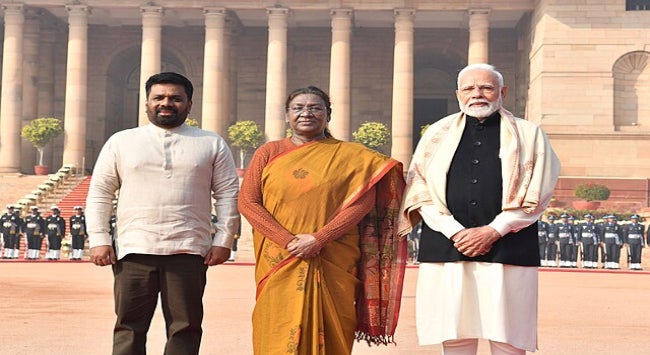Sri Lankan President Dissanayake’s India Visit: Geopolitical and Security Challenges under the NPP Government
Rajni Gamage, Tanujja Dadlani
19 December 2024Summary
Sri Lanka’s President Anura Kumara Dissanayake recently made his inaugural state visit to India, marking an important juncture in bilateral relations between the two neighbours. The National People’s Power secured a strong domestic mandate in the November 2024 elections by winning a parliamentary supermajority. This visit represented an opportunity to strengthen ties with India while navigating complex domestic, geopolitical and security challenges.
Sri Lanka’s President Anura Kumara Dissanayake made his first official visit to India from 15 to 18 December 2024. Bilateral discussions centred around economic cooperation, investment opportunities and regional security. India is a critical economic partner, providing US$5 billion (S$6.7 billion) in aid since the 2022 crisis and supporting Sri Lanka’s application for an International Monetary Fund (IMF) bailout. Sri Lanka has since secured a US$2.9 billion (S$3.9 billion) IMF bailout package and restructured its debt with bilateral creditors and private creditors by December 2024.
The bilateral visit saw an emphasis on increasing connectivity between the two countries, and supporting each other’s multilateral engagements.
Connectivity and Multilateralism
Both countries committed to establishing electricity-grid connectivity and multi-product petroleum pipelines between the two nations, accelerating the Sampur Solar Power Project, and implementing the Economic and Technology Co-operation Agreement (ETCA) to enhance bilateral trade. The ETCA seeks to add to the India-Sri Lanka Free Trade Agreement but was previously stalled in 2018, due to opposition over an inflow of Indian Labour force by groups such as the Janatha Vimukthi Peramuna, the main political party within the ruling NPP. Talks to restart the ETCA began in November 2023 under the Ranil Wickremesinghe government.
In addition, there were discussions on establishing a new ferry service between Rameshwaram and Talaimannar. The two countries also agreed to expedite the implementation of the Sri Lanka Unique Digital Identity project to promote digital financial transactions.
India has also conveyed full support for Sri Lanka’s chairmanship of the Indian Ocean Rim Association. Dissanayake also requested Indian Prime Minister Narendra Modi’s support for Sri Lanka’s application to become a member of the BRICS. In November 2024, Sri Lanka’s application to join the BRICS was rejected. Subsequently, the country was accepted as a member of the BRICS’ New Development Bank.
Geopolitical and Security Challenges
Besides these avenues of cooperation, there are some issues that could pose a challenge to the bilateral relationship.
Among these is the proposed Adani Group’s US$440 million (S$594 million) wind power project, aimed at developing 484 megawatts of wind power in the northeastern regions of Mannar and Pooneryn. Although the NPP pledged to cancel the project after coming to power, it has adopted a more cautious approach since September 2024, promising a review of all Indian connectivity projects first. Despite the recent bribery allegations against Adani in the United States (US), the Sri Lankan government has indicated it is moving forward with this project. The issue is likely to become politically sensitive for Colombo as the project has faced legal challenges and is surrounded by concerns over environmental impacts and a lack of transparency in the bidding process.
Another key bilateral issue is the 13th Amendment to Sri Lanka’s Constitution, which was introduced as part of the 1987 Indo-Lanka Accord to address Tamil minority grievances by devolving power through the Provincial Council system. Key figures within the NPP have expressed contradicting views on whether the 13th Amendment and the Provincial Council system would be continued. The NPP has indicated it will explore power devolution to smaller units of administration as part of a new constitution it will introduce. During the bilateral visit, the Indian side reiterated the call for the implementation of the Provincial Council elections despite mention of the same missing from the joint statement. Sri Lanka has not held Provincial Council elections since 2014.
Another area of bilateral tension relates to territorial and maritime issues. During India’s 2024 elections, Modi reignited the Kachchatheevu Island sovereignty dispute. Furthermore, India has raised concerns over Sri Lanka’s attempt to extend its continental shelf to access cobalt-rich resources in the Afanasy Nikitin Seamount. During the bilateral visit, Dissanayake requested for Modi’s intervention on Sri Lanka’s claim to the United Nations Commission on the Limits of the Continental Shelf for the establishment of the outer limits of the continental shelf beyond the Exclusive Economic Zone. Dissanayake also stressed the need to find a “durable”, “sustainable” and “humanitarian” solution to fishermen from both countries being arrested and detained for allegedly poaching in each other’s territorial waters, and on the issue of bottom trawlers.
Geopolitical Balancing and Security Concerns
Sri Lanka’s strategic location in the Indian Ocean places it in the middle of regional geopolitics, requiring diplomatic balancing between India and China. During the bilateral visit, Dissanayake reiterated to India that Sri Lanka’s territory will not be used against Indian interests.
Domestic security issues add another layer of complexity to Sri Lanka’s foreign relations. In October 2024, several embassies, including those of the US, Britain and Israel, issued travel advisories, citing potential terrorist threats targeting tourist hotspots like Arugam Bay. Sri Lankan authorities, with Indian intelligence support, acted quickly to address the threat, underscoring the importance of regional security cooperation.
The bilateral visit is also expected to accelerate the finalisation of the Security Cooperation Agreement, which will enhance cross-country cooperation on maritime security, counter terrorism, cyber security, combating smuggling and organised crime and humanitarian assistance and disaster relief.
. . . . .
Dr Rajni Gamage is a Research Fellow at the Institute of South Asian Studies (ISAS), an autonomous research institute at the National University of Singapore (NUS). She can be contacted at r.gamage@nus.edu.sg. Ms Tanujja Dadlani is a research analyst at the same institute. She can be contacted at tanujjad@nus.edu.sg. The authors bear full responsibility for the facts cited and opinions expressed in this paper.
Picture credit: https://commons.wikimedia.org/w/index.php?search=Dissanayake&title=Special:MediaSearch&go=Go&type=image
-
 More From :
More From :
-
 Tags :
Tags :
-
 Download PDF
Download PDF



